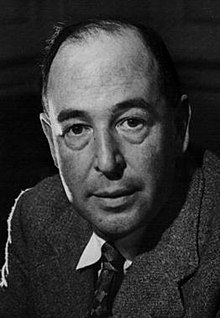Victory
Clive Staples Lewis 1898 (Clive Staples Lewis Belfast) – 1963 (Oxford)
Roland is dead, Cuchulain's crest is low,
The battered war-rear wastes and turns to rust,
And Helen's eyes and Iseult's lips are dust
And dust the shoulders and the breasts of snow.
The faerie people from our woods are gone,
No Dryads have I found in all our trees,
No Triton blows his horn about our seas
And Arthur sleeps far hence in Avalon.
The ancient songs they wither as the grass
And waste as doth a garment waxen old,
All poets have been fools who thought to mould
A monument more durable than brass.
For these decay: but not for that decays
The yearning, high, rebellious spirit of man
That never rested yet since life began
From striving with red Nature and her ways.
Now in the filth of war, the baresark shout
Of battle, it is vexed. And yet so oft
Out of the deeps, of old, it rose aloft
That they who watch the ages may not doubt.
Though often bruised, oft broken by the rod,
Yet, like the phoenix, from each fiery bed
Higher the stricken spirit lifts its head
And higher-till the beast become a god
Font size:
Submitted on May 13, 2011
Modified on March 05, 2023
- 58 sec read
- 67 Views
Quick analysis:
| Scheme | ABBA XCCX DEED FGGF HIIH JKKJ |
|---|---|
| Closest metre | Iambic pentameter |
| Characters | 999 |
| Words | 193 |
| Stanzas | 6 |
| Stanza Lengths | 4, 4, 4, 4, 4, 4 |
Translation
Find a translation for this poem in other languages:
Select another language:
- - Select -
- 简体中文 (Chinese - Simplified)
- 繁體中文 (Chinese - Traditional)
- Español (Spanish)
- Esperanto (Esperanto)
- 日本語 (Japanese)
- Português (Portuguese)
- Deutsch (German)
- العربية (Arabic)
- Français (French)
- Русский (Russian)
- ಕನ್ನಡ (Kannada)
- 한국어 (Korean)
- עברית (Hebrew)
- Gaeilge (Irish)
- Українська (Ukrainian)
- اردو (Urdu)
- Magyar (Hungarian)
- मानक हिन्दी (Hindi)
- Indonesia (Indonesian)
- Italiano (Italian)
- தமிழ் (Tamil)
- Türkçe (Turkish)
- తెలుగు (Telugu)
- ภาษาไทย (Thai)
- Tiếng Việt (Vietnamese)
- Čeština (Czech)
- Polski (Polish)
- Bahasa Indonesia (Indonesian)
- Românește (Romanian)
- Nederlands (Dutch)
- Ελληνικά (Greek)
- Latinum (Latin)
- Svenska (Swedish)
- Dansk (Danish)
- Suomi (Finnish)
- فارسی (Persian)
- ייִדיש (Yiddish)
- հայերեն (Armenian)
- Norsk (Norwegian)
- English (English)
Citation
Use the citation below to add this poem to your bibliography:
Style:MLAChicagoAPA
"Victory" Poetry.com. STANDS4 LLC, 2024. Web. 25 Apr. 2024. <https://www.poetry.com/poem/6974/victory>.



Discuss the poem Victory with the community...
Report Comment
We're doing our best to make sure our content is useful, accurate and safe.
If by any chance you spot an inappropriate comment while navigating through our website please use this form to let us know, and we'll take care of it shortly.
Attachment
You need to be logged in to favorite.
Log In